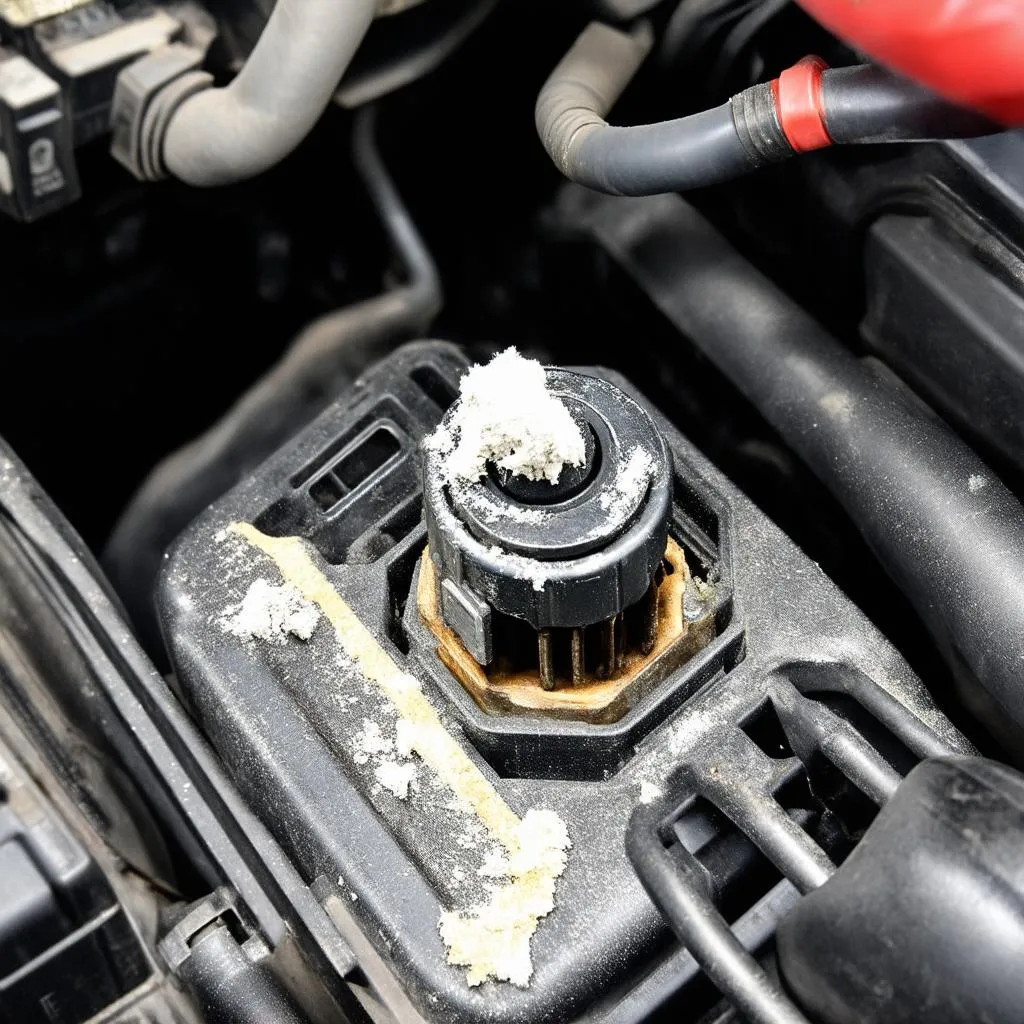Picture this: you’re late for work, rushing out the door, and hop into your car. You turn the key, but instead of the satisfying roar of the engine, you’re met with…silence. Or worse, a disheartening clicking sound. Your heart sinks – it’s your car battery.
Dealing with car battery problems can be a real drag, but don’t worry! This comprehensive guide will walk you through everything you need to know about car battery troubleshooting, from identifying common issues to getting your car started again.
Why is My Car Battery Giving Me Trouble?
Before we dive into the solutions, let’s understand why car batteries act up in the first place.
From a mechanic’s perspective, car batteries are the beating heart of your vehicle’s electrical system. They provide the initial jolt of energy needed to start your engine and power everything from your headlights to your radio. Over time, batteries naturally degrade due to a process called sulfation, where lead sulfate crystals build upon the battery plates, reducing their ability to hold a charge.
Technically speaking, a car battery is a lead-acid battery that relies on a chemical reaction to produce electricity. When the battery discharges (like when you start your car), lead sulfate forms on the battery plates. When you charge the battery, this lead sulfate is converted back into lead and sulfuric acid. However, over time, some lead sulfate doesn’t convert back, leading to a gradual loss of battery capacity.
Of course, a dying battery isn’t just a technical issue. It can impact your wallet too. Replacing a car battery can be an unexpected expense, and delays caused by a dead battery can lead to missed appointments, lost productivity, and even safety concerns.
Common Car Battery Problems and How to Fix Them
Now, let’s get down to the nitty-gritty of car battery troubleshooting. Here are some common battery woes and what you can do about them:
1. Battery Won’t Hold a Charge
The Problem: Your battery seems to die quickly, even after a recent jump start or charge.
Possible Causes:
- Old Age: The average car battery lasts about 3-5 years.
- Extreme Temperatures: Both hot and cold weather can shorten a battery’s lifespan.
- Parasitic Drain: Even when your car is off, certain components can slowly drain your battery.
Troubleshooting Tips:
- Check the Battery’s Age: If it’s nearing the end of its lifespan, it’s probably time for a replacement.
- Inspect for Corrosion: Clean any corrosion on the battery terminals with a baking soda and water solution.
- Test Your Battery: A multimeter or a battery tester can tell you the battery’s voltage and overall health.
- Address Parasitic Drain: Consult a mechanic to identify and address any electrical components draining your battery.
2. Clicking Sound When Starting
The Problem: You hear a rapid clicking sound when you turn the key, but the engine won’t turn over.
Possible Causes: This usually indicates a weak battery that doesn’t have enough power to start the engine.
Troubleshooting Tips:
- Jumpstart Your Car: Connect your battery to another car’s battery using jumper cables.
- Charge Your Battery: If the jumpstart works, charge your battery fully using a battery charger.
3. Headlights Dim or Flickering
The Problem: Your headlights appear dimmer than usual, especially when starting the car.
Possible Causes: A weak battery may struggle to power your headlights, especially during the high-demand period of starting the engine.
Troubleshooting Tips:
- Check the Battery Voltage: Use a multimeter to check the battery’s voltage.
- Consider a Battery Replacement: If the voltage is consistently low, a new battery might be necessary.
4. Slow Engine Crank
The Problem: Your engine cranks slowly when you turn the key.
Possible Causes: This is another sign of a weak battery that’s struggling to deliver enough power to the starter motor.
Troubleshooting Tips:
- Test Your Battery: A load test can help determine your battery’s ability to hold a charge under stress.
- Inspect Battery Cables: Ensure that the battery cables are clean, tight, and free of corrosion.
Preventing Car Battery Problems
Now that you’re familiar with common car battery issues and their solutions, here are some tips to keep your battery healthy and avoid being stranded:
- Regular Battery Maintenance: Inspect your battery regularly for corrosion, clean the terminals, and check the electrolyte levels (if applicable).
- Limit Short Trips: Short trips don’t give your battery enough time to recharge fully.
- Turn Off Electronics: Before turning off your car, ensure all lights, accessories, and electronics are switched off.
- Keep Your Battery Charged: If you don’t drive your car often, consider using a battery maintainer to keep it topped up.
Still Having Battery Trouble?
Car battery issues can sometimes be tricky. If you’re still experiencing problems after trying these troubleshooting tips, don’t hesitate to seek professional help.
Dr. Sarah Miller, a renowned automotive engineer and author of “The Complete Guide to Car Battery Maintenance,” suggests that “consulting a qualified mechanic is always recommended when dealing with persistent battery problems. They have the expertise and tools to diagnose complex electrical issues and ensure your car’s electrical system is functioning optimally.”
Need More Help With Your Car?
Check out these other informative articles on our website:
Get Back on the Road with Diag XCar
We hope this guide has shed some light on the world of car battery troubleshooting. Remember, a little preventative maintenance goes a long way!
If you need assistance with diagnostics tools or have any further questions, our team of automotive experts is here to help. Contact us via Whatsapp at +84767531508 for 24/7 support. Safe travels!


